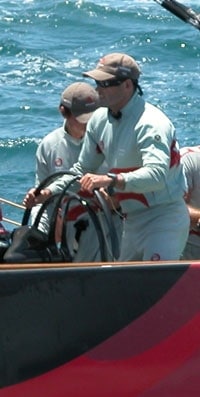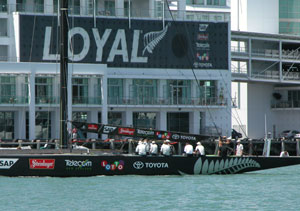
As Americas Cup 2003 looms, ESPNs Gary Jobson, Sailing Worlds editor at large, sat down with Alinghi Skipper Russell Coutts for an exclusive interview. Coutts skippered Team New Zealand to victory in 1995 and 2000. After the 2000 match, Coutts and several key crew members, shocked New Zealand by signing with a new syndicate from Switzerland. The pressure on Coutts has been immense in his home country. But Coutts looks at the opportunity as a “breath of fresh air.” If Alinghi defeats Team New Zealand in a best-of-nine series, which starts on Feb. 15th, the next Americas Cup will be held in Europe. ESPNs live coverage of the racing begins at 7 p.m. (EST) on Feb. 14th.
Jobson: Now that youve been both a challenger and a defender, which is harder?
Coutts: Well, I think they both have their complexities. I think being a challenger, you have quite a long series to go through and I can see how Prada wouldve suffered last time because youve finished the Louis Vuitton Cup and youve achieved a goal and its your time to come down and then you have to raise your game again for the Americas Cup and they only had a week to do that. As a defender, some of the disadvantages are you dont get to race anyone else. And so you dont really quite know. You think you know where everythings positioned, but youre not really that sure.
Jobson: Well, you think over there in the Team New Zealand camp, theres a lot of uncertainty because they didnt race in the challenger trials?
Coutts: Well, everything Ive seen about them and heard about them is suggesting theyre very confident. So, they must have a good reason to be that confident and I suspect that theyre confident. Theyve got good hardware and that they are well prepared and have a good team. And, it looks pretty good to me.
Jobson: How about the long gaps between the end of the trials and the Cup? Is this an advantage or a disadvantage?
Coutts: I think its an advantage in a competitive sense, but I do think the whole Cup programs just too long.
Jobson: I asked Dean Barker how he would feel against racing against you and he said, “Actually, I welcome it. Ive spent so much time racing against Russell as a trial helmsman last time, I feel pretty comfortable with it.” So, how do you feel racing against Dean Barker?
Coutts: The same thing applies. Im not sure that we are making a big thing out of the fact we know each other. But, over three years, people change and I know my sailing style certainly changed and I presume his has as well.
Jobson: How important are some of the guys around you? Im thinking of Brad Butterworth, Warwick Fleury, Simon Daubney, and Murray Jones.
Coutts: Real important. I mean, not only those guys, but of course, in this team, we have people like Jochen Schümann and Josh Belsky and Curtis Blewitt and Chico (Francesco Rapetti), Pieter Van Nieuwenhuyzen,. All of these guys from different nationalities, admittedly, but theyre all very, very good to sail with.
Jobson: Is it hard to bring people of different nationalities together as a team?
Coutts: It was hard to begin with, but there are actually some advantages with bringing a different group together. Particularly, when you have the opportunity to select who you want. And, it stimulated a lot of new ideas. New ways of looking at things and, certainly, Ive learned a lot about sailing from people like Jochen Schümann.
Jobson: Were you surprised by the so-called hull appendage or “Hula” on Team New Zealand?
Coutts: We werent surprised by it because of the rule interpretation that came out at the beginning of October. I think its an interesting idea. Theyve obviously done a great job with their design as always, and were predicting their boats going to be pretty fast.
Jobson: Have you tried something like the Hula?
Coutts: Yes. We have. Weve been experimenting with it on our boats and have had some good testing with it.
Jobson: Are you going to sail with one?
Coutts: Youll have to wait and see for “Unveiling Day”.
Jobson: Are you going to have any challenge to the legality of the thing or is it a past issue?
Coutts: I think the measurers do a good job of insuring the legality of the boats. We have no control really over the legality of it and Im confident the measurers will do their job as theyve done in the past.
|
|
| |
|

|
| |
| Stuart Streuli|
| |
|
|
| |
| Coutts says the Loyal campaign, which should not be confused with the controversial Blackheart effort, has only increased his desire to take his native country’s prize possession to Europe.* * *|
| |
|
|
|
Jobson: Russell, with all this “Loyal” campaign I see all over town, has that affected your sailing at all?
Coutts: No, if anything, its probably made me a bit more¿well I think Im pretty determined anyway, but it certainly hasnt affected me negatively. I cant say I agree with it, but thats the path that campaigns chosen.
Jobson: We noticed you came out with quite a full story of what went on between 1995 and 2000 and the so-called “hand off”. Do you find people a little more sympathetic to your position now that the full storys out?
Coutts: We certainly didnt expect any sympathy, but I think people perhaps understand it a little bit better. We had an obligation not to say anything and we honored that agreement.
Jobson: We talked a few months back and you said that the team that spent the most money hasnt ended up winning the Cup in the last four or five Cup campaigns and maybe thats going to happen again. So, if moneys not the answer, what is the answer to winning this Americas Cup?
Coutts: Youve got to have an adequate budget, but once you have that, using your time wisely, properly, not wasting time is a big key. Making the big decisions right and in a lot of ways, spending an adequate amount of time to ensure that you have the best possible chance of making those big decisions right. Those really are the key. People. Thats one of your biggest decisions. Hiring the right people.
Jobson: Well, speaking of people, you know all of us in our various endeavors always have a key few people that we talk to, whether its a wife or a manager or brother. Who are the key people that you talk with?
Coutts: Well, in this syndicate, certainly in an afterguard sense, Jochen Schümann, Brad Butterworth, and Murray Jones are obviously a big part of the decision-making. But, at Alinghi, we distribute roles pretty broadly and give people real responsibility in one area. One of the sailors that has been involved in a few other campaigns said one of the biggest differences in this campaign is youre actually given a task. You have to run with it and you know that if you dont run with it, it wont get done. Nobody else is going to actually come in and mother you. It either has to happen by the people, you know, the people are responsible for what theyve got to do.
Jobson: Dean Barker told us that its been very helpful to him that he actually raced Race 5 in the last Cup, understanding what its like to be out there by yourself with your hand on the wheel and thats been in his head all the time. Do you regret having given him the wheel for that last race now that your racing against him?
Coutts: Absolutely not! At that stage, I was trying to build a future for Team New Zealand and Id to the same today.
Jobson: What do you think are some of his tendencies out on the race course? You know him pretty well having raced against him?
Coutts: Three years is a long time. Hes no doubt, developed his skills to a new level and sailing against Bertrand Pace and his new team. Theyve no doubt developed the lot. Ill be interested to see how theyve progressed.
Jobson: Lets fast-forward for a minute. The starts of Race 1 and were coming up to that first cross. One guys going to be ahead. One behind. Do you feel a lot of tension building up?
Coutts: Of course you do. I mean, the whole atmosphere of an America’s Cup day. It’s a big event and once you get into the starting sequence, you tend to forget about everything that’s going on around you and pretty much focus on the race. And, I don’t think there will be an easy answer to this. I don’t think it’ll be in the first 10 minutes of the race.
Last time, it wasn’t until Race 3 that we were pretty confident with our speed.
Jobson: Do you think that keeping the challenger trials in a 7-19 knot window was a good move?
Coutts: I think its a ridiculous move. But, once it happened, you couldnt really do much about it because everyone had built their sails for that wind range. It was pretty hard to change the rules after theyd put them in.
Jobson: It could blow 25 knots for three straight days here during the Cup?
Coutts:Sure. Sure it could. We have to be ready for that.
Jobson: Thats a lot of pressure too. Hey, do you have a prediction for us?
Coutts: Well, I think that the best team and the fastest boat will win.
Jobson: Are you confident?
Coutts: Im happy with where we are. I never usually go into a big event feeling super-confident. I always respect the opposition and this is no different. I certainly respect Team New Zealand.
Jobson: You mentioned that over the past three years, you, as any athlete would, have changed your sailing style. How has it changed?
Coutts: I think Ive had a lot of advice from people like Jochen and I think that hes a fabulous sailor. Hes got a fabulous feel for a boat and it changed the way I sail downwind for sure and certainly even upwind¿just ideas on some of the ways we were using the sails¿I helm the boat quite differently to what I did in the past. Yeah, so, some pretty big changes.
Jobson: You won the cup in 95, which is obviously a huge deal. You defended it in 2000, which is obviously a huge deal and I know that moving to Alinghi was not under the best of circumstances. But, I wonder, having won two Cups, was it time to move on anyway?
Coutts: Absolutely. You know, the great thing about having the opportunity to join Alinghi and start a new team from a blank sheet of paper, is that it was a breath of fresh air. It gave some of us, thatve been involved in quite a few Americas Cup campaigns with the same people, a different look on things and were able to view things from a different perspective and thats healthy. Change is sometimes healthy.









